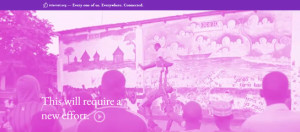Facebook and six other tech companies have launched a joint project called Internet.org which aims to connect the two-thirds of the global population that is not currently linked to the Internet.
The other founding members of the project are Ericsson, MediaTek, Nokia, Opera, Qualcomm and Samsung, who will develop joint projects, share knowledge, and work with industry and governments to boost Internet connectivity using mobile technology, Facebook said Tuesday.
Only 2.7 billion people — just over one-third of the world’s population — have access to the Internet, and Internet adoption is growing by less than 9 percent each year, according to Facebook.
The move by Facebook and partners is one of a number by tech vendors, including Google and Microsoft, to increase penetration of the Internet, and consequently of their products and services in developing countries.
Microsoft, for example, said in February it was collaborating with the Kenyan government and a local Internet service provider to provide broadband access using TV white spaces and solar-powered base stations, as part of a long-term strategy to spread mobile telephony and Internet connectivity in Africa.
TV white spaces are the unused portions of wireless spectrum in the frequency bands generally used for television.
The new initiative is also planning to work on the reallocation of white space spectrum to lower the cost of providing Internet, as “licensing spectrum from governments worldwide costs tens of billions of dollars and these costs are passed along to consumers through data plans,” according to a plan posted by Facebook CEO Mark Zuckerberg on his Facebook profile.
“Facebook has already invested more than $1 billion to connect people in the developing world over the past few years, and we plan to do more,” Zuckerberg wrote.
The focus of the new plan will be on lowering cost of access through projects such as low-cost smartphones and working with mobile operators to deploy Internet connectivity in under-served communities. Facebook and partners also plan to reduce data usage by apps and other services through data compression tools, networks that handle data more efficiently, systems that better cache data and frameworks for apps to reduce data usage.
The initiative will also aim at localization of content and services through partnerships and also creating sustainable business models for delivery of Internet at affordable prices, with incentives for operators, device makers, developers and other businesses.
The Internet.org website is live, and provides more information on the plan. The effort will benefit from work done by Facebook-backed Open Compute Project, a collaborative project that aims to lower the costs of cloud computing by making hardware designs more efficient and innovative. The Open Compute Project, for example, is working on an open network switch design for Internet data centers, Zuckerberg wrote.
Facebook had 699 million daily active users on an average in June this year, and about 80 percent of these came outside the U.S. and Canada, indicating large opportunities for the company in developing markets.





